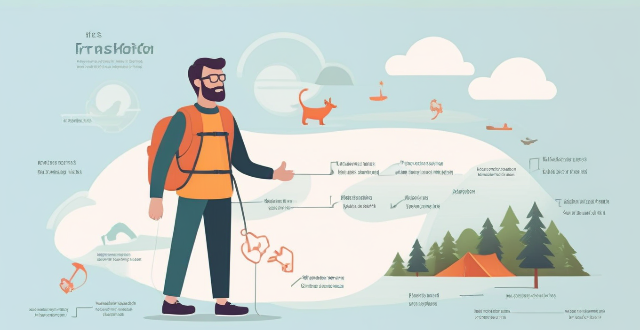When planning a backpacking trip, it's important to avoid common mistakes that can compromise safety and enjoyment. These include not researching the trail or destination, overestimating your abilities, bringing inadequate gear, packing too much or too little, ignoring weather forecasts, neglecting food and water preparation, traveling solo without a plan, and ignoring Leave No Trace principles. By avoiding these mistakes, you'll be better prepared for a safe and enjoyable backpacking trip. Remember to always prioritize your safety, respect the environment, and have fun exploring the great outdoors!

Common Mistakes to Avoid When Planning a Backpacking Trip
1. Not Researching the Trail or Destination
- Insufficient Information: Failing to gather enough information about the trail's length, terrain, weather conditions, and potential hazards can lead to unpreparedness.
- Lack of Permits or Regulations: Overlooking the need for permits or not understanding local regulations can result in legal issues or being turned away from certain areas.
2. Overestimating Your Abilities
- Physical Fitness: Underestimating the physical demand of the trip can lead to exhaustion, injury, or having to turn back early.
- Skill Level: Attempting advanced trails without proper training or experience can be dangerous.
3. Inadequate Gear
- Quality Footwear: Wearing improper footwear can cause blisters, discomfort, and increase the risk of accidents.
- Essential Equipment: Not bringing essential items like a map, compass, first aid kit, or sufficient food and water can compromise safety.
4. Packing Too Much or Too Little
- Excess Weight: Carrying too much gear can slow you down and increase the risk of injury.
- Insufficient Supplies: Not packing enough clothing layers, food, or emergency supplies can leave you unprepared for changing conditions.
5. Ignoring Weather Forecasts
- Unpredictable Climate: Failing to check weather forecasts before departing can expose you to unexpected storms or extreme temperatures.
- Inappropriate Clothing: Not packing appropriate clothing for the predicted weather can lead to hypothermia or heat exhaustion.
6. Neglecting Food and Water Preparation
- Nutritional Needs: Not planning meals that provide enough calories and nutrients can result in fatigue and poor performance.
- Water Availability: Assuming there will be accessible water sources along the way without verifying it can lead to dehydration.
7. Traveling Solo Without a Plan
- Emergency Contact: Not informing anyone about your itinerary or expected return time can delay search and rescue efforts if something goes wrong.
- Self-Rescue Capabilities: Not being prepared with knowledge of how to handle emergencies or perform self-rescue techniques can be risky when traveling alone.
8. Ignoring Leave No Trace Principles
- Environmental Impact: Failing to follow Leave No Trace practices can harm wildlife and degrade the natural environment for others to enjoy.
- Waste Disposal: Improper disposal of waste can pollute water sources and disrupt ecosystems.
By avoiding these common mistakes, you'll be better prepared for a safe and enjoyable backpacking trip. Remember to always prioritize your safety, respect the environment, and have fun exploring the great outdoors!